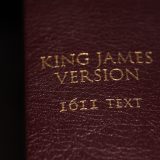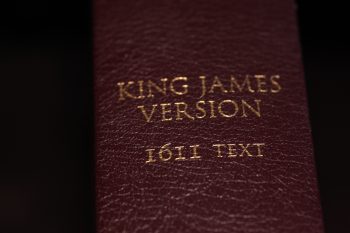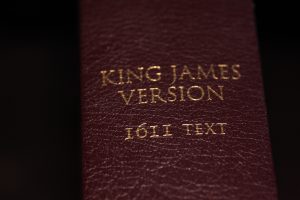The King James Bible – King James I – 1611
Reviewed by: Michael Sympson Date: 17 September 2001
I was nine, when for the first time I had read the Bible from cover to cover, but I never read it in any other way than as a piece of imaginative literature. I was under no religious pressure and still thank my god every day that he made me an atheist. If I feel like it, I read Virgil for my religious needs. Consequently, after the grand sweep of the Hebraic Bible, the New Testament struck me even as a teenager, as something of a let down and I still think it should rather be left out. So let’s not waste any more time on it. For readers at a loss where to begin, I recommend as an appetizer 1 Kings 13, a gem of Kafkaesque humor:
 A “prophet” receives the calling to deliver a message to his king on condition that he doesn’t tarry on his way and does not take food and shelter even on his way back. But an elderly colleague cheats on the man and lures him into accepting food and shelter under the pretence of a divine vision of his own. So how is the traveller to know that God hadn’t changed his mind? The two prophets sit at their meal when suddenly the spirit seizes the lying host and from his mouth issues genuine prophesy and announces to his perplexed guest that lions will eat him for his disobedience. And so it happens. The lying prophet who had caused the calamity feels remorse, searches the road for the corpse and buries him his own tomb – “Oh brother!” The whole Bible in a nutshell.
A “prophet” receives the calling to deliver a message to his king on condition that he doesn’t tarry on his way and does not take food and shelter even on his way back. But an elderly colleague cheats on the man and lures him into accepting food and shelter under the pretence of a divine vision of his own. So how is the traveller to know that God hadn’t changed his mind? The two prophets sit at their meal when suddenly the spirit seizes the lying host and from his mouth issues genuine prophesy and announces to his perplexed guest that lions will eat him for his disobedience. And so it happens. The lying prophet who had caused the calamity feels remorse, searches the road for the corpse and buries him his own tomb – “Oh brother!” The whole Bible in a nutshell.
We look at a nation’s intellectual heritage: the older Isaiah, a near contemporary to Homer and truly a poetic genius of the highest order; the younger Isaiah, an independent mind and worthy contemporary of Heraclitus, who dares to think the unthinkable. Jeremiah lived at Sappho’s time and wrote the first autobiography in western literature (Jerem. 1:1-12; 11:18-23; 15:10-21; 17:14-18; 20:7-12, 14-18) which became a model for Augustine’s “Confessions.” The “Song of Solomon” was composed either in Alexandria or Antioch, roughly at the time of the pastoral poet Theocrit. Notice how the author has pillaged the entire Bible for set-phrases, allusions, and verbal references. It is ostentatious poetry, it is also a bit of a rabbinical crossword puzzle. (Logically the song itself cannot be earlier than the latest of these references.) Ecclesiastes is an early forerunner of Friedrich Nietzsche, and the monumental succession saga of kingship and betrayal and of love in every variety, outshines Herodot’s “Histories.” King Saul is still my hero, and no matter how expertly the post-exile author has done the whitewash – David is definitely the villain.
This book speaks to us in many voices: “a great and strong wind rent the mountains, and broke to pieces the rocks but Yahweh was not in the wind: and after the wind an earthquake; but Yahweh was not in the earthquake: And after the earthquake a fire; but Yahweh was not in the fire: and after the fire a still small voice.” (1 Kings 19:11-13). Of course, mostly we look at fiction, not history. Characters and places do not match and the incidents are anachronistic projections from a later period. The impressive ruins excavated at Samaria and Dan rightfully belong to the “House of Omri,” but “Chronicles” and “Succession” sagas had been written under a Davidic bias and credit Solomon, perhaps falsely, for the fortifications at Megiddo, Hazor and Gezer.
As a matter of fact the Kingdom of Israel was the real deal. The house of David found itself removed to a little backwater enclave around Jerusalem. Despite all the noises about “idolatry” and “abomination” it was the North that prospered, before it finally succumbed to Assyria’s imperialism. Notice, that only after Yahweh’s fundamentalists under Josiah and Hezekiah had pushed through their reforms, things began to go very wrong in Judah too and ended (at least temporarily) in complete annihilation of Hebraic statehood. No matter how you look at it: grumpy old Yahweh had betrayed his people. Which is not surprising: at times Jethro’s ‘spiritus familiaris’ could show signs of a perfidious nastiness: see Exodus 4:24 etc. where “by the way in the inn, Yahweh met Moses, and sought to kill him.” “Gods make dangerous company” says the Iliad.
And the further back we go into the past the more we lose ourselves in anachronisms. Numbers gives a real law code but assigns it to the wrong period. The narrator of Genesis 37:25 is familiar with the camel as beast of burden and the goods it is supposed to carry, but this is removed by more than a millennium from the Bronze age culture of Abraham and Joseph. So the story of Joseph has all the makings of a novel. Besides, one wonders what the Jewish Passover really celebrates. It is a chilling thought to ponder who in real life might have been this strangely selective “Angel of Death,” who had murdered Egypt’s first born. The fugitive terrorists around Moses might have had a lot to atone for.
For the faithful the Prophets are an endless subject of fascination. Yet from the context it is quite clear that the recipients of prophetic messages did not exactly expect a piece of fortune telling. Prophets received their commissions for casting spells – mostly nasty spells. The folk tale of Balaam’s Ass (Num. 22) illustrates the method. The idea was to make things happen, not to predict them. So we see the Jewish prophet Ezekiel take a commission from the king of Babylon(!) and put a curse on Tyrus (Ezek. 26). Ezekiel performed as usual, (no other prophet could go so completely bonkers,) but the military follow up turned out to be difficult. So Ezekiel was asked for a second installment. True to form, he promised Egypt that it will be the robber’s recompense for the hardship he had suffered with his first victim. (Ezek. 29.) I have no idea whether prophets got paid in advance or based on “success,” but obviously only reasonably successful spells were kept on record, which makes only a fraction of the large number of actual “prophecies.” Ambitious prophets better had a good portfolio, (1 Kings 22; Jerem. 28;) because with so many competitors on the case, one of them might actually get it right.
If we start reading the book from the beginning, we should know that Genesis 1 is a late post-exile concoction which replaced and re-edited the original creation myth. It can still be reconstructed from all the relevant passages (Ps. 74:120-13; Ps. 89:9-10; Isaiah 51:9-10; Job 1:6, 2:3-6, 8:9, 9:5-11, 26:5-14, 36:27-30, 37:2-13; 38:4-12, 14, 17, 22-25, 28, 30-32, 35; 41:1-10, 18-34; Nahum 1:2, 1:3-5; Habakkuk 3:3-6; 2 Kings 19:24-28 and brief references in Jeremiah) and a very different picture emerges of a god (or rather a whole tribe of gods) who had constructed their new order out of a pre-existing chaos, which was inhabited by a monster (the priestly insertion Gen. 1:2 uses the term “Tehom” for “deep” which is the Hebraic (and Canaanite) equivalent to the Babylonian “Tiamat,” the dragon of the watery chaos).
So first it became necessary to defeat the monster which had sought to drown the deities’ attempts before they even began. But the most warlike of the gods, Yahweh, rode against Tehom in his chariot of fire, and bombarded her with hail and with lightning, then he destroyed her vassal, Leviathan, with one great blow to the monster’s skull, while he finished off Rahab by thrusting a sword into her heart. The waters fled backward, Yahweh shouted his triumph and dried up the floods. Tahom’s carcass could now provide the necessary building material, to create a new world. Simply by speaking the word, the Elohim created the Sun, the Moon and the Stars. They stretched out the skies like a tent cloth to shroud the deep, and placed their secret court above the skies and the waters of high. The Moon was set to divide the seasons and the Sun to separate day and night. The morning stars sang together, and all the gods shouted for joy. Thus the work of creation was completed.
 It is a familiar pattern, found in many mythologies – the Olympian gods had to defeat the giants; the Norse deities kill a giant and his wife who were the first sentient beings even before the gods. Interestingly even the late Gen. 1 preserves the plural in Elohim which is of course no accident. The Hebraic religion had originated from a polytheistic affair not unlike their Canaanite neighbors (Jer. 44:18), though certain dietary customs had set apart the Hebrews from early on. The Yahweh cult was a comparably late introduction and for the longest time it remained a minority movement confined to certain cult centers and a thinly spread elite (if you want to call them that) who held the monopoly on the written word. Only exile completely changed the picture.
It is a familiar pattern, found in many mythologies – the Olympian gods had to defeat the giants; the Norse deities kill a giant and his wife who were the first sentient beings even before the gods. Interestingly even the late Gen. 1 preserves the plural in Elohim which is of course no accident. The Hebraic religion had originated from a polytheistic affair not unlike their Canaanite neighbors (Jer. 44:18), though certain dietary customs had set apart the Hebrews from early on. The Yahweh cult was a comparably late introduction and for the longest time it remained a minority movement confined to certain cult centers and a thinly spread elite (if you want to call them that) who held the monopoly on the written word. Only exile completely changed the picture.
In one of his few lucid moments, Northrop Frye suggested, to read the Bible not as an anthology or assemblage of random documents but as a deliberate unity, an editorial composition with point and purpose. (This applies even to the New Testament where the so called “gospels” and epistles are designed to lead to and interpret the book of “Revelation.” The councils originally had hesitated to accept Cerinthus’ “Revelations” in the developing canon, because Cerinthus was a Gnostic and deemed a heretic. So the way to make “Revelations” acceptable, was to falsely ascribe authorship to John the Evangelist (Eusebius “Ecclesiastic History” III. xxviii. 1-2). But this is a different story. It explains however how important “Revelations” was for the editors.) I have to admit that in Frye’s reading the Biblical text acquires an additional dimension, not in religious terms, but in terms of fantasy and imagination. It becomes the novel of a different world from a parallel universe. A novel which obviously had a profound influence on the making and unmaking of Western civilization.
Bible translations have become for many nations something like the generator (if not beginning) of literacy and good use of language. This alone should assure the King James her place of honour in English literature. But even from the point of accuracy it still remains to be the outstanding achievement, despite the proliferation of “modern” translations which use to come with all sorts of bogus claims of “improvement” and downright misinformation about the King James. Fact of the matter is, that the committee of translators had been carefully chosen and those gentlemen did not just use the Latin Vulgate but all the sources available including Origin’s Hexapla and the Masoretic Bible. There is an easy test. Check the modern translator’s rendition of the term “love” in Paul’s letters. Only the King James seems to be aware that there is a difference between agape and eros: love and charity.
















